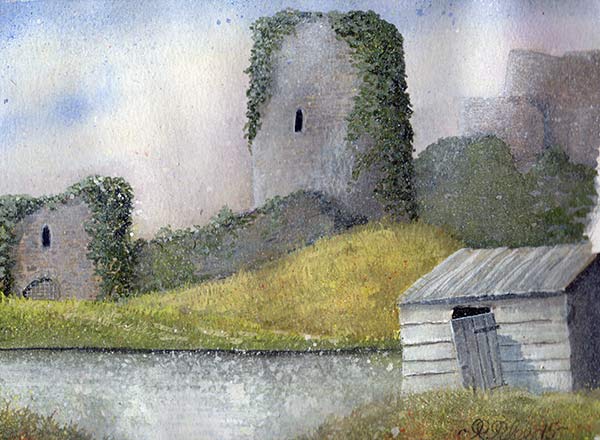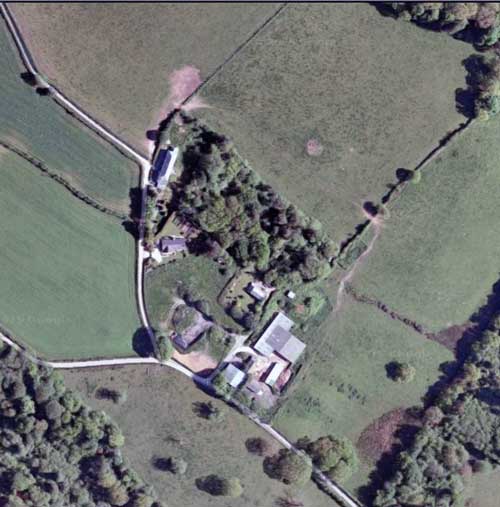Taken from an article by Otho Peter published in the Cornish and Devon Post in 1909.
In the year 1440 the manors of Dunheved and Launceston were separately governed by two powerful lords. The former by Sir John Trelawny, a nobleman who acquitted himself so well at the battle of Agincourt that he had been rewarded by being appointed constable of the castle of Dunheved and allowed to place under the royal coat of arms which used formerly to be set over the western gateway of that fortress, the distich:–
“He that will do ought to me
Let him love well Sir John Trelawny;”
and the later by William Shyre, prior of the local priory of St. Stephen, who like other monastical lords of that period, had almost ceased to be a political agent of the Pope and sunk into a mere landed aristocrat whose one aim appeared to be to preserve the wealth of his priory, and to keep his dependants under the control of the Church by preaching from pulpits and confessionals of the district a belief in witchcraft, astrology, and other superstitions. From each of these manors had been sliced out sections which were known as the borough towns. The burgesses who resided within these townships had by charters from the Crown acquired landed property, and it was the object to keep their holdings for themselves and not to share them with ‘strangers’ who were not burgesses by birth or had failed to purchase a right of entrance. This naturally led to all the big and all the little landlords who lived outside these ‘close boroughs’ becoming jealous of the powers which were thus being placed in the hands of the people, and it was through the machinations of one of them that the mayors of Dunheved had a degraded office imposed upon them by the governor of the Castle who represented the law and the Crown,
There lived in the parish of North Hill, about seven miles out west, a land owner named Roger Carew. He resided on his estate of Treveniel, and also owned a small plot of land in Dunheved borough, for which he was paid by the burgesses the sum of three silver pennies a year. This rent had been agreed upon some time before under the following singular circumstances:– It chanced that two kinsmen waged a duel to death concerning this tenement. They fought, it is said, for six hours, each conquering by turns. Then one of them in fleeing from his opponent fell and broke his arm, but the other, on reaching the spot where the fallen man lay, would not take advantage of the mishap, and refused to kill him, where at the Mayor and burgess onlookers, moved by pity and hate of the foreign custom of duelling which had taken the place of trial by jury, persuaded the victor to accept the above mentioned fee from them for the plot, the condition being that he was to use his influence in Parliament to revive the old English custom of pleading. But there must have been some misunderstanding between the parties, for although trial by jury was revived, Roger Carew still claimed to sell and buy freely in the town and to be on the list of voters. John Mayow, the contemporaneous mayor, refused to allow these claims. It was over this matter that a new quarrel began, and the parties concerned subsequently seemed to have seized every opportunity that offered to annoy one another.
Before settling down at Treveniel, Carew had served in the French wars which ended so disastrously for England. Finding country life monotonous he, at the time of this story, had, for the sake of being employed, undertaken to superintend the construction of the bridge over the Kensey brook at St. Thomas for the prior of Launceston. This bridge was near one of the boundaries of Dunheved, and on Mayow going down to see that there was no encroachment being made on the land of his borough, he noticed that Carew was there as foreman, and remembering the feud, determined to play him a trick. He for some time kept looking attentively at the work, then muttering between his teeth, measured what he had erected, walked with gravity across, and seemed to be engaged in an elaborate criticism of the whole. Carew thereupon went up to him and asked what fault he found with the structure. I have noted important information for my Council, said Mayow, as to the lines of this bridge, but I must be off for it is my dinner hour. Carew being anxious to avoid further trouble then asked him to dine with him at the Priory and Mayow assented. It was Friday, and the only remark made during the meal was that it was strange that the monks were said to eat nothing but fish on that day, and yet that there should be such a strong smell of venison in the room. After dinner they returned to the bridge and Mayow walking up and down for a few minutes turned to Carew and said “My friend you have done wisely in building your bridge across the river for if you had tried to build it the long way the devil’s in it if you would have succeeded.” Mayow then made his bow, and took his leave.
Carew’s anger, was so aroused at this affront that he determined to repay it with interest. He had a brother who was one of the canons at the priory and on his telling him what had been said about the venison they between them concocted a scheme which caused the mayor’s downfall, and by their compact it was agreed that they should trump up a charge of witchcraft against Mayow’s wife and work the case in such a way as to cause her husband to assault Roger Carew with the precincts of the Castle, which would be an offence against the Crown.
Mrs. Mayow, a buxom, black eyed dame, much given to the gathering of herbs, and dispensing them to her customers as cures for various complaints, and as it was reported that she also sold charms, it was an easy matter for a wily monk to entrap her. One day when Canon Carew knew that Mayow was engaged at a distant market, he as the officiating priest at the borough Chapel OF St. Mary Magdalene, visited the old lady, and after asking her why she had not been a regular at mass and confession lately, informed her that he was sorry to say that certain persons had charged her through him with having sold them enchanted wafers bearing the the figure of a cross as charm against the evil eye, and that he had felt it his duty to lay evidence before Governor Trelawny. Mrs. Mayow strenuously denied that she was in fault, but the testimony of suborned witnesses was so strongly against the poor woman that she was condemned to be burnt alive. On the afternoon of the day which had been appointed for the execution of this horrid mandate, a goodly mob of people with

Roger Carew in their midst might have been entering the Castle gate and gathering together at the foot of the witches Tower (left). On this round building a stake had been fixed and to it dame Mayow was chained and faggots were being piled around her, when just as a monk was lifting his hands in prayer and the faggots were being lighted, Mayor Mayow, the husband, who had been sent for post haste, hurried into the green, and clearing a way through the crowd with his quarter staff until he reached the spot were Carew was stationed, called him a name and struck him of his horse. Then rushing to the tower he felled the gaoler, and after releasing his wife gave himself up to the Governor.
Now Trelawny, although he was jealous of the people’s power, was a just man, and on his hearing the truth as to the charge against Mrs. Mayow he released her, but as a mark of displeasures at the action of the Mayor in knocking Carew from his horse on the King’s land he ordered that Mayow, and all future Mayor’s of Dunheved, should be bound to hold the stirrup of the lord of the manor of Treveniel whenever he mounted his horse within the borough on any occasion that a Duke of Cornwall should enter the town.
No Duke of the Duchy is known to have afterwards visited Dunheved until the days of Charles II, and as that Prince was too worried about other affairs to think about enforcing the order, there is no evidence to show that the degrading office has ever been performed. The fee of three pennies was compounded for about the middle of the nineteenth century, when Bodmin took over (stole as Otho put it) the County administration offices from Dunheved, and it thenceforward ceased to appear in the Mayor’s ‘quietus’ accounts, and this was no doubt the reason why no Mayor has been asked to hold the stirrup for the Squires of North Hill during the four feudal due ceremonies held in the twentieth century.

Visits: 93
